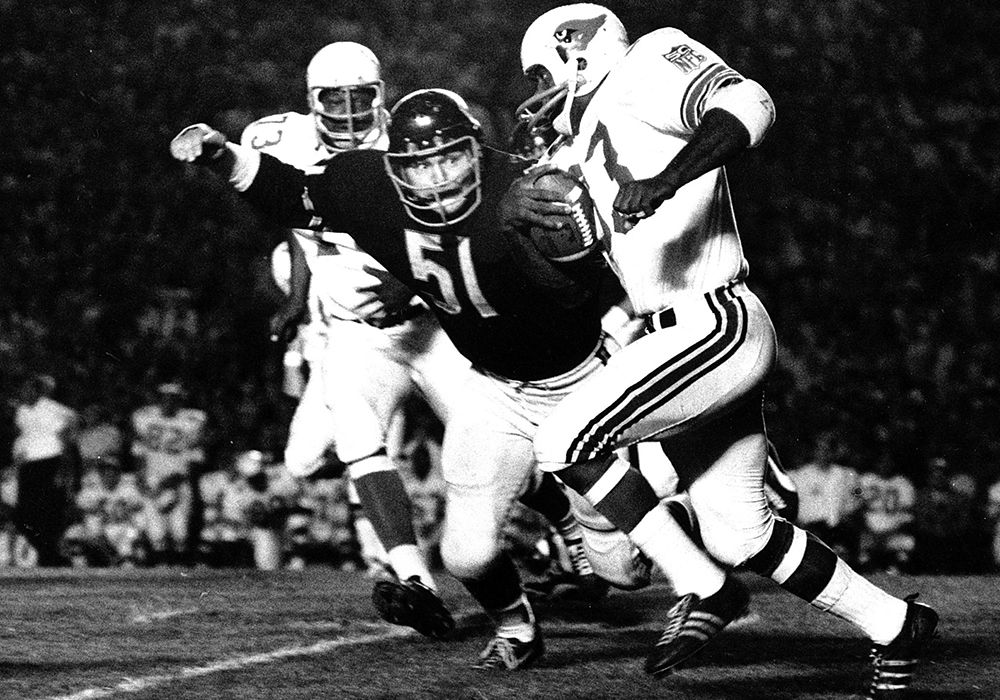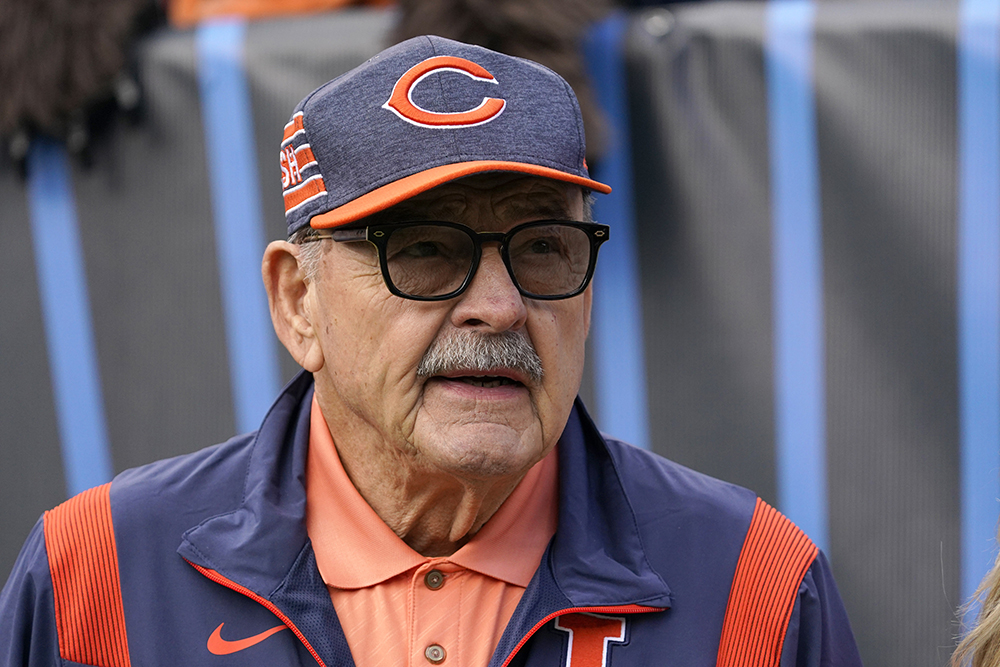Elected as a member of the Pro Football Hall of Fame’s Class of 1979 in his first year of eligibility, Butkus died early Thursday at his home in Malibu, Calif., his family said. He was 80.
“Near universally, Dick Butkus, a hometown hero in Chicago, was considered the person who defined the position of middle linebacker,” said Hall of Fame President Jim Porter. “He established a level of production and intensity few have matched. USA Today once called him the ‘gold standard by which other middle linebackers are measured.’
“Playing in an era when middle linebacker became one of the game’s glamour positions — and several of Dick’s contemporaries also would end up in the Pro Football Hall of Fame — his name most often was cited first as the epitome of what it took to excel at the highest level.”
Fellow Hall of Famer JIM BROWN, not one to throw around praise loosely, concurred, saying in his autobiography: “Butkus played in the 1960s and early 1970s, the era of the great middle linebackers — (RAY) NITSCHKE, (CHUCK) BEDNARIK, (JOE) SCHMIDT, Mike Curtis, (SAM) HUFF, Lee Roy Jordan, WILLIE LANIER, Tommy Nobis — but I think no man did it better than Butkus.”
Butkus received numerous accolades during and after his injury-shortened career: two-time NFL Defensive Player of the Year (once on a team with a 1-13 record), NFL All-Decade Team of the 1960s and of the 1970s, NFL 75th Anniversary Team and NFL 100 All-Time Team among the most noteworthy.
He called making the NFL 100 All-Time Team a “very humbling experience.”
“Give 100% effort and good things will happen,” he said, adding, “I looked up to RAY NITSCHKE,. When I was playing, I looked up to BILL GEORGE. Both outstanding Hall of Fame kind of people.”
George, a member of the Hall’s Class of 1974 and the Bears’ middle linebacker for roughly a decade before Butkus’ arrival in Chicago, said: “I’ve never seen anybody who was such a cinch. The day Dick showed up in camp, I knew I was out of a job. … Nobody ever looked that good before or since.”
Richard Marvin Butkus was born Dec. 9, 1942, in Chicago. He excelled in multiple sports in high school, then attended the University of Illinois.
He is one of four players in the school’s history to earn consensus All-American honors in two seasons and led the Illini to the 1963 Big Ten title and a Rose Bowl victory over Washington.
Butkus was a three-time All-Big Ten selection and the 1963 Silver Football Award winner who finished third in the 1964 Heisman Trophy balloting. In 1986, Illinois retired his No. 50 jersey.
In 1999, he was named to the Walter Camp Football Foundation’s All-Century Team, a squad compiled to honor the best college players of the 20th century.
Butkus was part of legendary draft
Coming off a 5-9 record in 1964, the Bears held three selections in the first round of the 1965 NFL Draft. They used of the first to take Butkus with the third overall selection. Hall of Famer GALE SAYERS was selected at No. 4 and the pair formed a lifelong bond.
Butkus made an immediate impact in the NFL with five interceptions, seven fumble recoveries, six forced fumbles (unofficially), the first of five first-team AP All-Pro designations and an invitation to the Pro Bowl. He finished third in MVP voting; Sayers won the award.
“After practicing and scrimmaging against Gale, I knew I could play against anybody,” Butkus said.
Sayers felt likewise but also felt the brunt of a few Butkus tackles.
“He hit you where it hurt — right in your heart,” Sayers said. “There was no one better than Dick Butkus.”
Players and coaches across the game shared that sentiment.
“His tackling was devasting, his instincts were absolutely unbelievable, but the thing that sets him apart from every other athlete I have known is his great, great intensity,” Pete Elliott, Butkus’ coach at Illinois and later executive director at the Pro Football Hall of Fame, said in presenting Butkus for enshrinement. “Dick played the game like it ought to be played: all-out, all the time, every game, every practice. Dick Butkus is a yard stick, a yard stick for linebackers of all types. He is also a yard stick by which any athlete can measure the intensity of his own personal effort to try to reach the goals that Dick has established.”

Longtime coach Howard Mudd told NFL Films, “I think a player that was great in his time is going to be great in all circumstances. Those people who are great players take over the game, and they take over the sport for the period of time that they’re in it. They take it over, and everyone knows who that player is. You can go watch the Chicago Bears play, and you’ll remember that Dick Butkus was there.”
Former center Ray Mansfield called Butkus “the greatest intimidator that ever played football,” and former running back Dan Reeves said, “He was just so competitive. … He didn’t want you to gain an inch. As soon as you had that football, you were the enemy.”
“He didn’t like anybody with a different-colored jersey,’ said Hall of Fame running back PAUL HORNUNG. “He went after you like he hated you from his old neighborhood.”
“He was the most unique defensive player that I ever saw come into professional football,” said Hall of Fame wide receiver RAYMOND BERRY. “The first year that he began to play, he began to do things to runners that no one had ever done before — tackling with one arm and pulling the ball out with the other.”
Bill Curry once called Butkus “the greatest football player I ever saw. I’m convinced he’s the greatest football player that ever lived.”
NFL Films said, “He was Moby Dick in a goldfish bowl.”
Butkus was unapologetic about his on-field demeanor, which he insisted was an on-off switch when the game ended.
“I could throw it, I could kick it, I could run the ball better than a lot of guys. But the thing that emerged above all else was the ease with which I played the middle linebacker position,” he said in his autobiography, “Flesh and Blood.”
“If football is played the way I was taught to play it, there was no pretense at good manners.”
Post-football career of Dick Butkus

Following football, Butkus could be seen on the big screen and on television. His numerous acting credits include the movies “Necessary Roughness” and “Any Given Sunday” and the guest-starring roles on “My Two Dads,” “Vega$” and “MacGyver” along with several commercials for Miller Lite.
Important to Butkus was the work of the I Play Clean Campaign that promoted healthy lifestyles and the avoidance of performance enhancing drugs, particularly among younger athletes.
“It’s payback time for me,” he said in an appearance discussing the campaign’s efforts. “The game was good to me, and I don’t want to see the game ruined.”
His name adorns the Dick Butkus Center, now part of the Orange County Heart Institute and Research Center in California.
Each season, the nation’s top college linebacker receives the “Butkus Award.”
On Oct. 31, 1994, the Bears retired his No. 51 jersey along with Sayers’ No. 40 jersey during a ceremony at Soldier Field. Butkus was a regular on the sidelines at Soldier Field.
Butkus is survived by his wife, Helen, his high school sweetheart. Together they raised three children.




